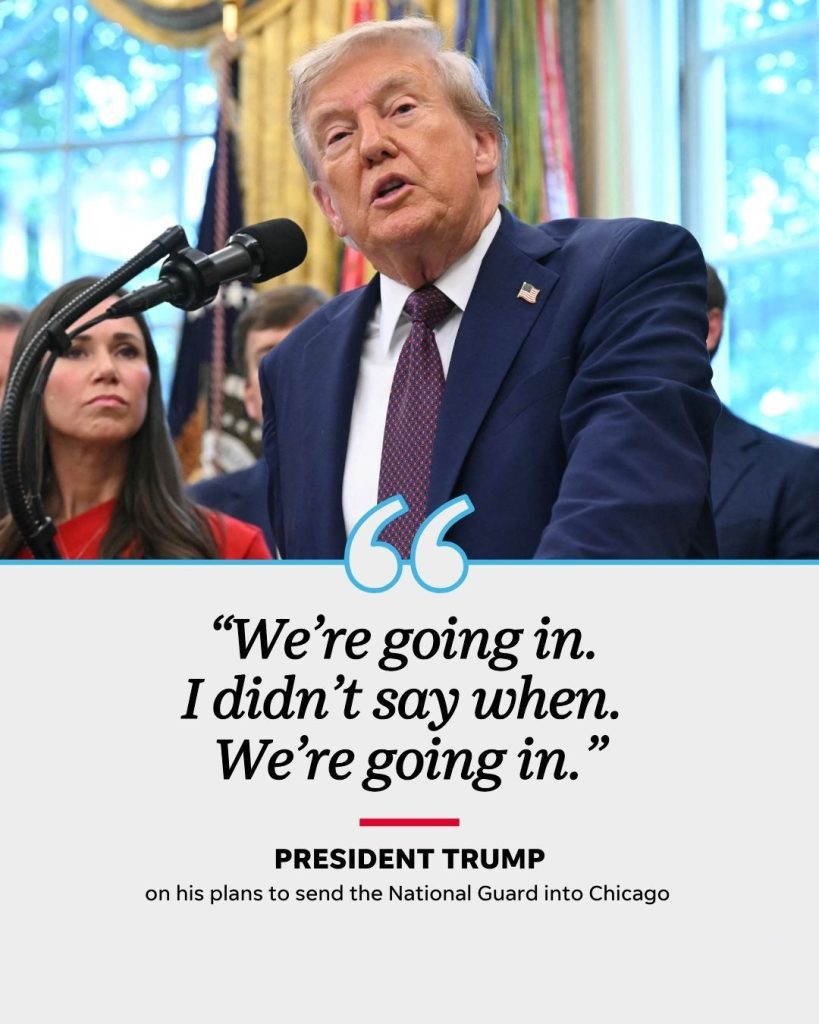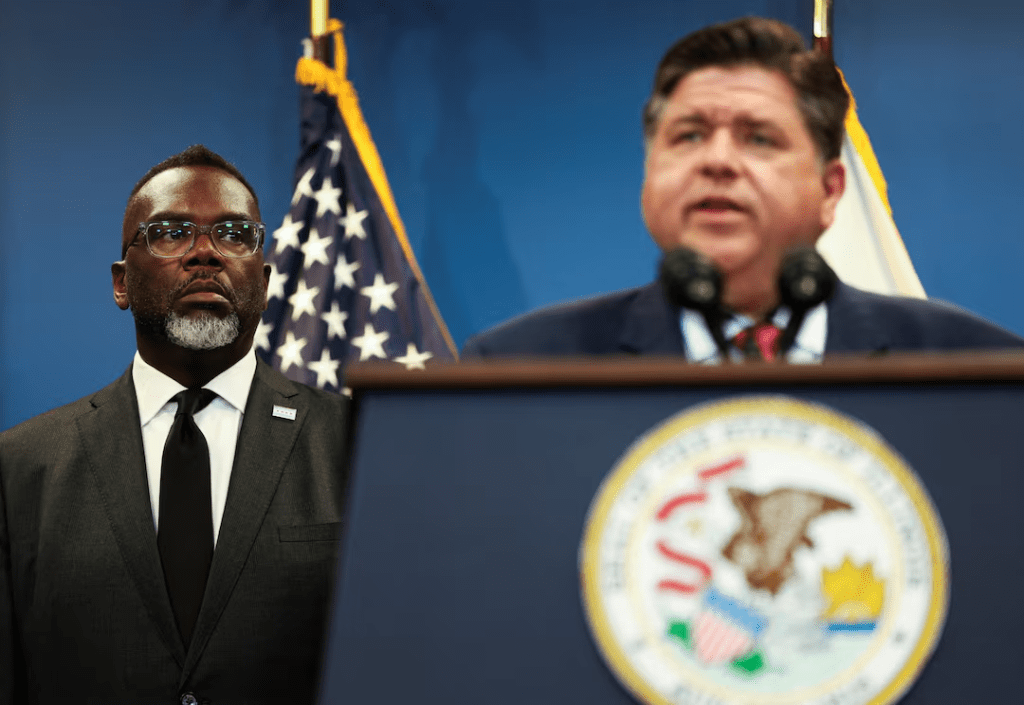A Bold Declaration From the Oval Office
On September 2, President Donald Trump announced that he intends to send National Guard troops into Chicago following a violent Labor Day weekend. His words, delivered during a briefing at the Oval Office, were direct and uncompromising: “We’re going in. I didn’t say when.” The statement echoed Trump’s long-running criticism of Chicago’s crime levels and set off a firestorm of political reactions across Illinois and beyond.

The Weekend That Sparked the Warning
According to the Chicago Police Department, at least eight people were killed and another fifty injured in shootings across the city during the holiday weekend. Trump seized on these numbers, labeling Chicago “the worst and most dangerous city in the World, by far.” On Truth Social, he went further, calling Chicago “the murder capital of the world.”
The President’s remarks weren’t isolated; they were part of a broader pattern. Trump has repeatedly criticized Democratic governors—including Illinois Gov. JB Pritzker—as failing to manage crime. He insisted, “Pritzker needs help badly, he just doesn’t know it yet. I will solve the crime problem fast, just like I did in DC.”
Governor Pritzker and Mayor Johnson Push Back
Illinois Governor JB Pritzker quickly rejected Trump’s offer, refusing to request federal assistance. “No, I will not call the president, asking him to send troops to Chicago. I’ve made that clear already,” Pritzker told reporters.
Video : ‘We’re going in’: Trump asked about deploying troops to Chicago
Chicago Mayor Brandon Johnson also responded firmly. Just days before, Johnson had signed an executive order stating that the Chicago Police Department would not assist federal agents in immigration enforcement operations. Standing alongside Pritzker, he described Trump’s move as an act of “tyranny” and accused the president of distracting from national problems. “Violence in Chicago isn’t about having too many immigrants. It’s because we have too many guns,” Johnson said.
Contradicting Narratives: Crime Trends in Chicago
Trump’s narrative of escalating danger clashes with local data. Chicago reported 278 homicides in 2025, a grim figure, but city officials note a dramatic decline in overall shootings—down 37% compared with last year and nearly 60% since 2021. Mayor Johnson argues that federal threats overshadow the progress being made, pointing to community programs and policing reforms that have reduced violence.
National Guard or Political Theater?
Vice President JD Vance, in an interview, emphasized that the administration does not plan a long-term occupation of Chicago. “We don’t want indefinitely to put National Guardsmen on the streets of our cities. We just want to make those streets more safe.” Yet critics argue that Trump’s rhetoric is more political theater than practical policy.

Civil rights leader Maya Wiley called out what she described as racialized narratives, saying, “The lies about crime, which are very racialized, and we should acknowledge it as such.” She argued that focusing on Chicago and Baltimore ignores broader issues of gun trafficking and systemic inequality.
Immigration Enforcement and Broader Federal Actions
The deployment of troops may not be the only federal intervention. State leaders warn that ICE raids targeting Latino communities are imminent. Lt. Gov. Juliana Stratton accused Trump of manufacturing a crisis for political gain. “This is not about public safety…What Donald Trump wants to happen is he wants to manufacture a crisis.”
Governor Pritzker added that Illinois officials have evidence of Texas National Guard troops being staged for possible deployment, underscoring his fears that Trump is preparing a multi-pronged federal push.
Clashing Visions: Public Safety or Overreach?
The debate over federal troops in Chicago encapsulates a larger divide. Trump insists cities need a forceful crackdown on violent crime, dismissing Democratic governors’ calls for housing programs, youth services, and jobs as distractions. “No, they don’t need housing. What they need is to get rid of criminals,” he said.
Video : President Trump on sending federal troops to Chicago: “We’re going in”
Opponents view the move as unconstitutional overreach. Norm Eisen, an ethics expert, said bluntly, “This is not lawful, it is not democratic, and it is not American.” He predicted courts would strike down the move, just as they did when Trump attempted a similar deployment in Los Angeles.
Voices Inside Chicago: Calls for Balance
Not every Chicago leader opposes the idea outright. Alderman Raymond Lopez suggested that National Guard troops could serve a limited role, protecting downtown landmarks and freeing Chicago police officers to focus on neighborhoods. “A month without a murder should be everyone’s goal,” he wrote on X, highlighting the urgent need for immediate safety alongside long-term solutions.
The Bigger Picture: Safety vs. Strategy
This clash between Washington and Chicago highlights two competing visions of public safety. Trump favors rapid, visible enforcement—troops on the ground, ICE in neighborhoods, a show of strength. Local leaders emphasize systemic solutions: cracking down on gun trafficking, investing in communities, and building opportunities to reduce crime at its roots.

Chicago stands at the center of this national debate, a symbol for both sides. For Trump, it’s proof of Democratic failure. For Pritzker and Johnson, it’s a city in recovery, targeted unfairly by a president more concerned with headlines than solutions.
Conclusion: A City in the Crosshairs
As of now, no date has been given for when—or if—National Guard troops will arrive in Chicago. What is clear is that the battle lines are drawn. Trump has made Chicago a centerpiece of his campaign-style rhetoric. Local leaders are equally determined to resist what they view as political intrusion.
Chicago’s struggle is not just about crime statistics. It’s about who gets to define the narrative of safety, justice, and democracy in America’s cities. Whether the president’s troops arrive or not, the story of Chicago in 2025 has become a defining moment in the nation’s political landscape.